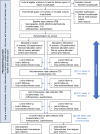A study protocol for a clustered randomised controlled trial to evaluate the effectiveness of a peer-led school-based walking intervention on adolescent girls' physical activity: the Walking In ScHools (WISH) study
- PMID: 32316957
- PMCID: PMC7171742
- DOI: 10.1186/s12889-020-08600-0
A study protocol for a clustered randomised controlled trial to evaluate the effectiveness of a peer-led school-based walking intervention on adolescent girls' physical activity: the Walking In ScHools (WISH) study
Abstract
Background: Adolescent girls in the UK and Ireland are failing to meet current physical activity guidelines. Physical activity behaviours track from childhood to adulthood and it is important that adolescent girls are provided with opportunities to be physically active. Walking has been a central focus for physical activity promotion in adults and may effectively increase physical activity levels among younger people. Following on from a pilot feasibility trial, the purpose of this cluster randomised controlled trial (c-RCT) is to evaluate the effectiveness of a novel, low-cost, peer-led school-based walking intervention delivered across the school year at increasing physical activity levels of adolescent girls.
Methods: The Walking In ScHools (WISH) Study is a school-based c-RCT conducted with girls aged 12-14 years from eighteen schools across the Border Region of Ireland / Northern Ireland. Following baseline data collection, schools will be randomly allocated to intervention or control group. In intervention schools, female pupils aged 15-18 years will be invited to train as walk leaders and will lead younger pupils in 10-15 min walks before school, at break and lunch recess. All walks will take place in school grounds and pupils will be encouraged to participate in as many walks as possible each week. The intervention will be delivered for the whole school year (minimum 20-22 weeks). The primary outcome measure is accelerometer-measured total physical activity (counts per minute) (end of intervention). Secondary outcomes will include time spent in sedentary behaviour, light, moderate and vigorous intensity physical activity, anthropometry measures, social media usage and sleep. A mixed-methods process evaluation will also be undertaken.
Discussion: The WISH Study will examine the effectiveness of a low-cost, school-based, peer-led walking intervention in increasing physical activity in adolescent girls when delivered across the school year. If the intervention increases physical activity, it would benefit adolescent girls in the defined target area with potential for wider adoption by schools across the UK and Ireland.
Trial registration: ISRCTN; ISRCTN12847782; Registered 2nd July 2019.
Keywords: Adolescent girls; Intervention; Physical activity; Schools; Walking.
Conflict of interest statement
The authors declare that they have no competing interests.
References
-
- Department of Health and Children, Health Service Executive . The national guidelines on physical activity for Ireland. 2009.
Publication types
MeSH terms
Grants and funding
LinkOut - more resources
Full Text Sources
Medical


